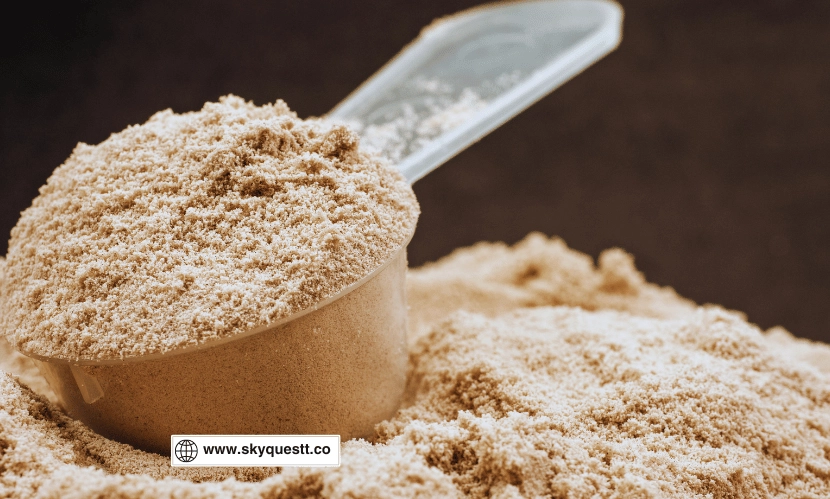
Navigating the world of protein supplements can be overwhelming, especially for newcomers. One common question is: What’s the difference between whey protein concentrate and whey protein isolate? Both come from milk during the cheese-making process but are processed differently. Whey concentrate contains around 70-80% protein, along with fats and lactose, making it a well-rounded and affordable option. Whey isolate, however, is more refined, containing 90% or more protein with minimal fats and lactose. It’s ideal for those seeking a low-carb, fast-digesting option, especially for post-workout recovery.
What Is Protein Powder?
In simple terms, protein powder is a convenient dietary supplement designed to deliver a concentrated amount of protein in an easy-to-use powdered form. It’s particularly helpful for those who find it difficult to meet their daily protein needs through whole foods alone.
Protein powder can be derived from various sources, including whey, casein, soy, pea, hemp, or a combination of different proteins. These options cater to different dietary preferences and nutritional needs, making it a versatile tool for anyone looking to boost their protein intake.
Where Does Whey Protein Come From?
Whey is a liquid byproduct that comes from the cheese-making process. During this process, milk is curdled to separate the solid curds, which become cheese, from the liquid whey. This liquid is then filtered to remove fats and other non-protein components, leaving behind a concentrated source of protein. Once this process is complete, the whey protein is dried into a powdered form for easy consumption.
What makes whey protein stand out is its fast absorption rate and its complete amino acid profile, containing all nine essential amino acids that the body cannot produce on its own. It’s particularly rich in branched-chain amino acids (BCAAs), especially leucine, a crucial amino acid that plays a major role in stimulating protein synthesis and supporting muscle growth. Because of this, whey protein is a popular choice among athletes and fitness enthusiasts looking to boost recovery and muscle development.
Are All Whey Protein Powders the Same?
No, whey protein powders are not all the same. There are different forms of whey protein powders, each with varying levels of protein concentration and other components, which set them apart from one another.
The most commonly found types include:
Whey protein concentrate (WPC): WPC typically contains between 70% to 80% protein, with the remaining portion made up of carbohydrates, lactose, and fats. This type is less processed, providing a more balanced mix of protein and other nutrients.
Whey protein isolate (WPI): WPI undergoes additional filtration to remove most of the fats and lactose, resulting in a protein concentration of 90% or more. This makes it an ideal choice for those looking for a purer form of protein with fewer carbs and fats, especially if lactose intolerance is a concern.
Protein blends: These supplements combine different protein sources, such as whey protein isolate or concentrate, plant-based proteins like soy or pea, or even lower-quality proteins like collagen. Blends offer a variety of benefits depending on their composition and can provide a broader range of amino acids.
Beyond these categories, factors such as the origin of the milk, processing techniques, and added ingredients like sweeteners, flavorings, and other additives play a crucial role in the final product’s quality. These variations directly influence the taste, texture, and overall performance of the protein powder, which is why you’ll often notice significant differences between brands and products.
Protein Powder Supplements: Taste and Tolerability
The taste and digestibility of protein shakes can vary greatly depending on individual preferences, allergies, sensitivities, and the type of protein used. Everyone’s body responds differently, and what works well for one person might not suit another.
For example, whey protein powder, which is derived from milk, may cause digestive problems for those with milk allergies. However, those with lactose intolerance may find relief by choosing a high-quality whey protein isolate, as it undergoes an extensive filtration process that removes most of the lactose, making it easier to digest for those sensitive to lactose but not milk proteins in general.
It’s also important to consider the quality of the protein brand you choose. Reputable protein brands that are backed by research tend to prioritize better ingredients and avoid unnecessary additives, which can reduce the risk of digestive discomfort. Cheaper products often cut corners by including lower-quality proteins, fillers, and additives that may trigger digestive issues. By opting for a well-reviewed, trustworthy protein brand, you can enjoy a better experience in both flavor and digestibility.
Unjury® Medical-Quality Whey Protein Isolate
Unjury prides itself on using only premium ingredients, beginning with dairy sourced from trusted farms in North America. This commitment to quality, combined with a meticulous filtration process, ensures a pure, clean product that requires minimal flavoring. The result is a highly concentrated protein powder that’s easy on the stomach, making it an ideal choice even for those with lactose intolerance.
Thanks to their careful ingredient selection and advanced filtration methods, Unjury protein powders offer a light, clean taste that blends seamlessly into a variety of beverages, smoothies, sauces, soups, and more, enhancing your meals without overpowering them.





